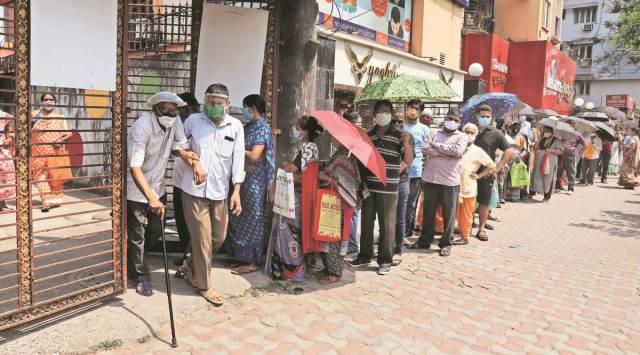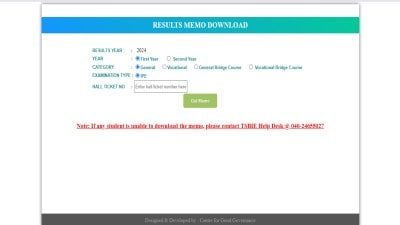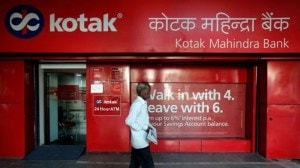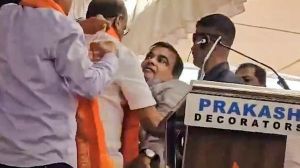- India
- International
What rate card does not show: Govt help in developing Covaxin
According to Bharat Biotech, the firm will supply more than 50 percent of its production to the Centre at Rs 150 a dose. The higher rates for States and private hospitals are necessitated by its needs to fund R&D for other vaccines, the company said.
 People wait for vaccination, in Kolkata on Tuesday. (Express photo by Partha Paul)
People wait for vaccination, in Kolkata on Tuesday. (Express photo by Partha Paul)LAST year, Bharat Biotech’s chairman Krishna Ella said that Indian vaccines, including his Covaxin, developed with help from the Government-run Indian Council of Medical Research, would cost less than a water bottle, almost a fifth.
Yet, his rate card Saturday announced Rs 600/dose for states and Rs 1,200 for private hospitals. Not just on pricing, there are also questions regarding Ella’s claim on ICMR’s role.
On April 21, Ella told NDTV Bharat Biotech had not received any government funding for the development of the vaccine.
“…We never took any money from the Government of India. Even, including our clinical trials…for Phase 2, Phase 3 trials, we spent Rs 350 crore. We never took money from the government,” he said.
However, the Clinical Trial Registry of India (CTRI) lists ICMR as the source of “monetary and material support” in Covaxin’s Phase 3 trials on over 25,000 participants.

That’s not all. Key to Covaxin’s development was the role of ICMR’s National Institute of Virology in Pune, which performed the crucial task of isolating the SARS-CoV-2 strain. In addition to this, it also assisted in some of the pre-clinical testing and human clinical trials of this vaccine.
Indeed, Government officials have been listed as authors in either Phase 1 or Phase 2 human clinical trials of this vaccine. They include ICMR Director General Dr Balram Bhargava, NIV Director Dr Priya Abraham and All India Institute of Medical Sciences (AIIMS) Dr Randeep Guleria.
As of September 18, 2020, ICMR spent “more than Rs 25 crore” from its intramural budget “for undertaking work related to development of vaccine candidate(s) and pre-clinical studies,” as per a Lok Sabha response by Ashwini Kumar Choubey, Minister of State for Health and Family Welfare.
However, it is unclear how much of this was used for Covaxin, as ICMR has also collaborated with other companies on the development of their Covid-19 vaccines.
The vaccine was also the subject of controversy earlier this year when it received restricted use permission from the top drug regulator despite not having enrolled and vaccinated enough participants on time to generate interim information on its efficacy.
The restricted use permission was given on January 3 in an emergency situation “in clinical trial mode” and “in public interest”, citing concerns of mutant strains of the virus and the vaccine’s potential to address them. The green light followed the reversal within 24 hours of an expert committee’s decision over whether it wanted to recommend the vaccine’s approval.
One reason for the vaccine’s final price being more than that of Covishield — the other Covid-19 vaccine in use in India — is the potentially higher expenses of making an inactivated vaccine at a Biosafety Level (BSL) 3 facility, according to experts.
“It is the need for production of the live virus in a BSL-3 facility followed by the inactivation and testing for the complete inactivation that makes the vaccine expensive,” said Gagandeep Kang, a vaccine expert who worked with Bharat Biotech in testing India’s first indigenously made rotavirus vaccine, Rotavac.
“That being said, Rs 600 is a ridiculous price,” she added, “for a vaccine that you’re going to sell in tens of millions of doses to State governments.” she said. “No vaccine costs that much.”
According to Bharat Biotech, the firm will supply more than 50 percent of its production to the Centre at Rs 150 a dose. The higher rates for States and private hospitals are necessitated by its needs to fund R&D for other vaccines, the company said.
“As a company, we would like to have the maximum (price) possible. So, we want to recover as much as possible — all the clinical trial costs and all other costs, and then put it back for R&D… We need (the) cash. There’s no question about that,” said Ella in his interview to NDTV.
Details of the agreements between ICMR and Bharat Biotech are opaque, especially with respect to the vaccine’s funding and profits.
Experts have raised questions about the ownership of the intellectual property (IP) of this vaccine — on the one hand, Bharat Biotech has been signing agreements for Covaxin with companies like Ocugen in the US. And on the other, the government has brought in Maharashtra-funded Haffkine Institute and Hyderabad’s non-government vaccine maker, Indian Immunologicals, to ramp up its capacity.
In order to help Bharat Biotech bring online its BSL 3 facility in Bengaluru, the Department of Biotechnology announced a grant of Rs 65 crore earlier this month. Yet, the terms of the deal are not in the public domain. On April 19, the Finance Ministry also relaxed rules that would allow the Health Ministry to pay Bharat Biotech Rs 1,500 crore in advance to procure doses of Covaxin.
Detailed queries to Bharat Biotech and ICMR remained unanswered.
In response to queries, DBT Secretary Renu Swarup said that the development of Covaxin “was supported by ICMR.”
DBT is supporting the development of other vaccine candidates by Bharat Biotech such as its single-dose intranasal vaccine for Covid-19 and its inactivated rabies vector platform-based vaccine, which are in early clinical and advanced pre-clinical stages of development, she said. In this regard, DBT has provided Bharat Biotech with funding support, she added.
DBT, which has funded “more than 15 vaccine candidates” during this pandemic, has been providing support for the clinical trial sites, immunoassay labs and animal challenge models “to facilitate all vaccine candidates through their development stage,” she said.
Apr 24: Latest News
- 01
- 02
- 03
- 04
- 05







































